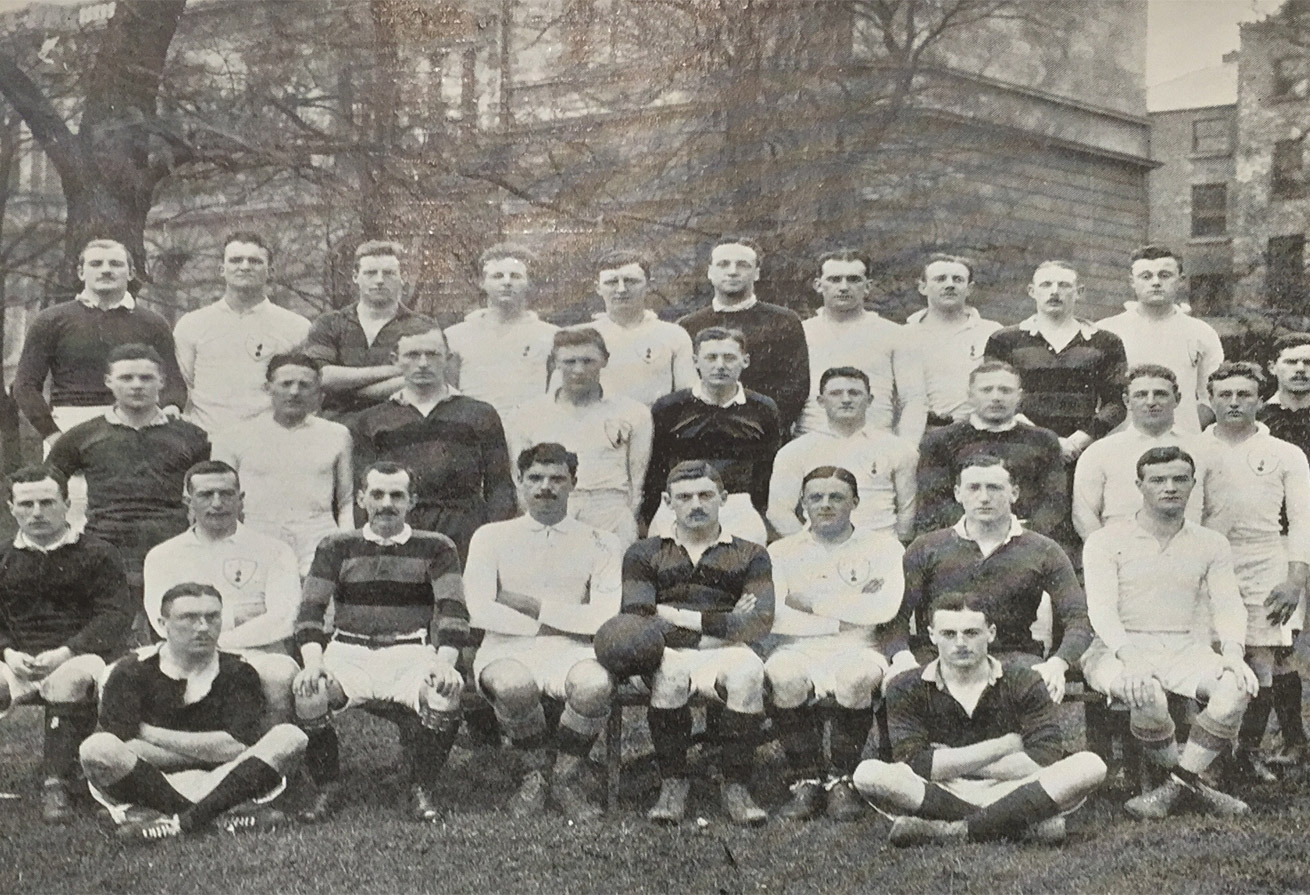

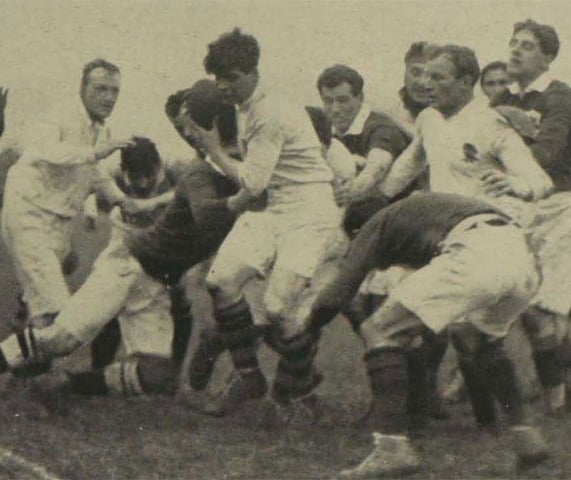
The Irish Rugby Football Union, in common with its English counterpart, reacted to the outbreak of the First World War with enthusiasm. Rugby football, in the minds of its adherents, was the perfect ideological and physical breeding ground for the armed forces, particularly the officer class. Moreover, to continue with mere sport when the British Empire was under threat would have been anathema to those who ran the game. The IRFU, an overwhelmingly protestant and unionist organisation, readily embraced this mindset and the regular rugby season gradually came to a halt in the autumn of 1914. The IRFU was responsible for more direct initiatives. As early as the first week of August, Frank Browning, under the auspices of the IRFU, had a letter published in the Irish Times seeking details from club secretaries as to how many of their members would be willing to join a (yet to be properly constituted) rugby volunteer movement. In mid-August, the Irish Rugby Football Union Volunteer Corps formally came into being and by the beginning of September, it had a membership of 250. The corps quickly divided into two outfits: D Company of the 7th Royal Dublin Fusiliers, who served in Gallipoli with the 10th Irish Division; and a group of older men who stayed behind in Dublin as a home defence corps. In mid-September the first contingent of rugby ‘pals’ departed for the Curragh with ostentatious pomp. After gathering in the parade ground at Trinity College Dublin, they marched through Dublin to Kingsbridge Station headed by the RIC band and before boarding carriages bearing the Union Jack, sang the national anthem. After further training at Basingstoke, D Company departed for Gallipoli in the summer of 1915.
The principal driving force behind the IRFU’s wartime efforts was the union’s president F.H. Browning. A Church of Ireland barrister in his mid-40s at the outbreak of war, Browning fitted the typical demographic profile of the contemporary Irish rugby administrator. By virtue of age, occupation and family commitments, Browning also fitted the typical profile of the IRFU Volunteer who stayed at home in the defence corps. The ‘old crocks', as they styled themselves, drilled, marched and even played some charity matches throughout the first two years of the war.
The 239 men who sailed for Gallipoli in August 1915 with D Company were under the command of Captain Poole Hickman, a Dublin barrister and Wanderers FC rugby player. Although men from the various professions joined up, the company was made up mainly of lower middle-class protestants - clerks and civil servants were prominent - and they were young: the approximate average age was 24. There was some social and cultural diversity in the group. Lieutenant Ernest Julian, for instance, was Reid Professor of Law at Trinity College Dublin. He was killed shortly after arriving at Gallipoli. While Michael Fitzgibbon, also killed in mid-August, was catholic and the son of the nationalist MP, former political prisoner and local Plan of Campaign leader, John Fitzgibbon. The rugby pals were perceived to have been socially superior to other units of the Royal Dublin Fusiliers and were referred to as the ‘toffs among the toughs’.
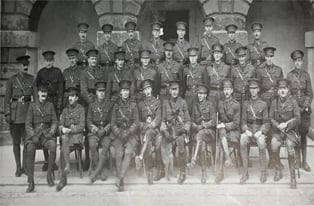
D Company arrived at Gallipoli in the first week of August to join an allied campaign that was already floundering. Their stay on the peninsula was short but calamitous. By the time they set sail for Lemnos just seven weeks later, the company had been decimated and its strength had been reduced to just 79 men. In one particularly disastrous manoeuvre on 16 August, D Company lost three commanding officers in succession and 54 men were killed after attempting to dislodge a group of Turkish bombers with a bayonet charge on a well-entrenched position in broad daylight at Kireçtepe. Hickman and Richard Tobin, another high-profile rugby player, were among the dead officers. Some stories of extraordinary courage emerged. Private Albert Wilkin, a protestant shop manager and Clontarf FC rugby player, was blown up when his tactic of catching enemy bombs and throwing them back at the Turkish position went fatally wrong. The bloodbath at Gallipoli had lasting consequences for some of those who survived. Jasper Brett, an Irish international in 1914 and a Monkstown club man, was so traumatised by his experiences on the peninsula that he committed suicide in Dalkey in 1917. Gallipoli, ultimately, was the end of the rugby pals as a coherent military unit. Most of the survivors were redeployed to the Balkans with the rest of the 10th (Irish) Division, while many also took up commissions in different regiments and were scattered across different theatres of conflict.
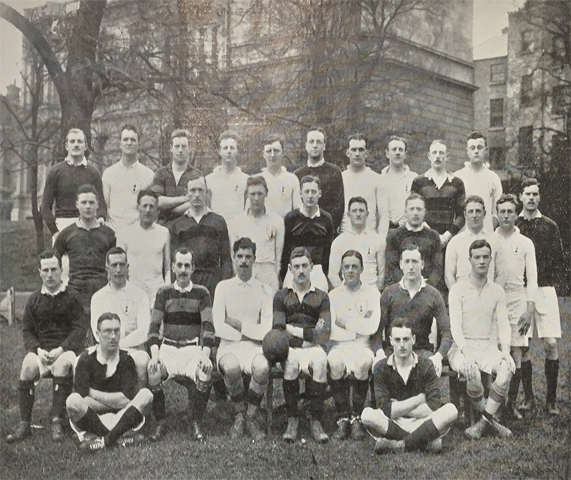
The perceived sacrifices made by the rugby union and its players during the war became central to the game’s collective memory in Britain in the post-war years and beyond. Memorials were erected and poetry was composed. The game of rugby served as an analogy for the game of war and had, in the minds of many, been crucial to processes of recruitment, motivation and training of soldiers. There are reasons to doubt this self-perception in an Irish context. Firstly, it seems difficult to establish the influence, if any, that rugby involvement had on the motivation of men to join the war effort. In clubs across Dublin, very few rugby players who went to war actually joined the rugby pals. The company, after all, was open to athletes from all codes. In fact, players within clubs did not join any regiment en bloc. 30 Trinity College Dublin men who played for the rugby club in 1913-14 ended up in 15 different regiments. The 24 Clontarf FC men who played for the club 1913-14 scattered to 14 different regiments. This was replicated in other clubs. The rugby club was not the cohesive agency of recruitment that ‘pals’ regiments were designed for. Irish men were motivated to join up for many reasons including money, career prospects, adventure, a sense of duty, and political persuasion. Rugby may or may not have dovetailed these in different ways. Rugby men who went to war had lives outside the game: they were members of churches, workplaces, universities, and were part of the private schools old boy network. If a rugby player’s social networks were key to his decision to join the army, any of these factors were just as likely as his sporting preferences, perhaps, to have been influential. This is illustrated on memorials. Poole Hickman, the original commanding officer of D Company who was killed at Kireçtepe, was posthumously recognised on the war memorials of the The High School Dublin, Avaron School in Bray, the Four Courts, and his rugby club Wanderers.
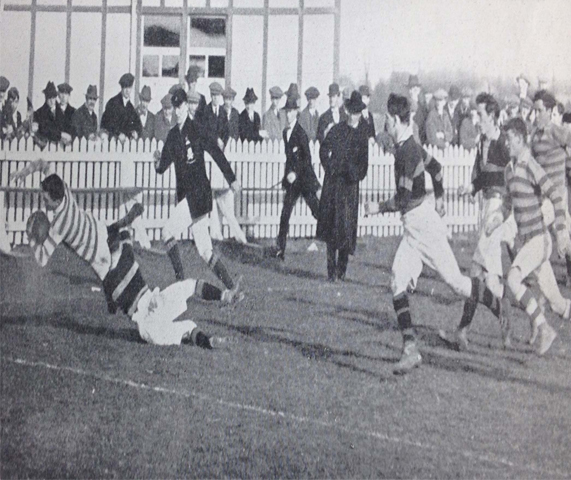
After their decimation at Gallipoli, the rugby ‘pals’ existence as a coherent military unit ended. The IRFU Volunteer efforts at home also came to a pitiable demise, largely as a result of events in Dublin on Easter week 1916. Browning and his comrades were returning from a training exercise in Ticknock on Easter Monday when they came under attack from rebel snipers, ironically, in the vicinity of the Lansdowne Road rugby ground. Browning, who led a detachment onto Haddington Road, came under attack from rebel snipers and sustained fatal wounds. Another member of the corps, a young Catholic and Belvedere College boy named Reginald Clery, was also killed in the attack. It was also ironic that the rebels involved were members of the Irish Volunteers 3rd Battalion Dublin Brigade, under the overall command of the rugby enthusiast Eamon de Valera. The final act of the IRFU Volunteer Corps, before it disbanded in October 1916, was to pay for the headstones of Clery and Browning and to pass on the proceeds of a collection among the surviving ‘pals’ in the Balkans to Browning’s widow. General Sir Bryan Mahon, commander of the 10th (Irish) Division, made the following observation of Browning’s demise:
'It was a sad fate for one who had done so much for Dublin, both by helping to raise the 7th Royal Dublin Fusiliers and also in leading the Dublin sportsmen so often to victory for many years at cricket and football.' (H Hanna, The Pals at Suvla Bay, Dublin, 1916, p.8)